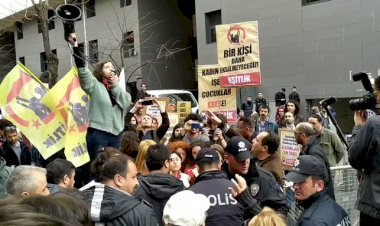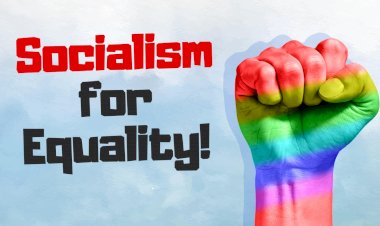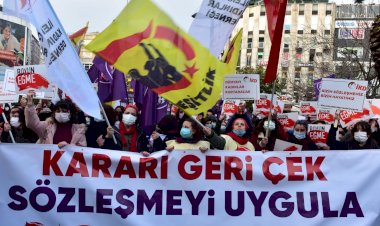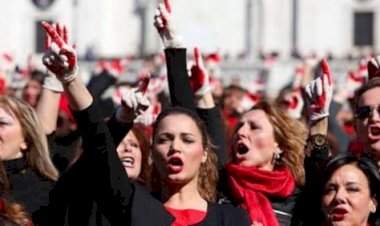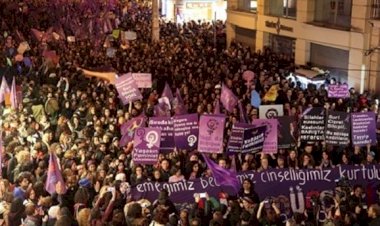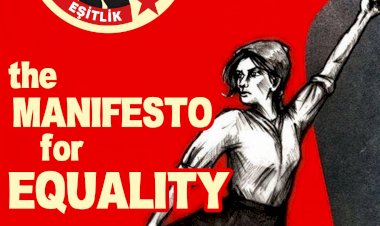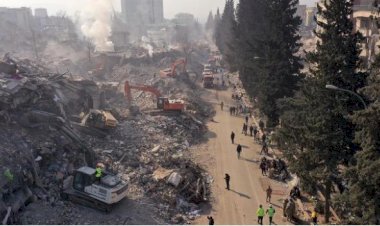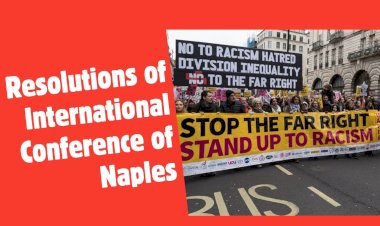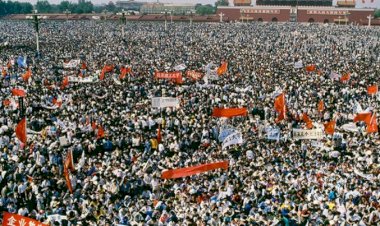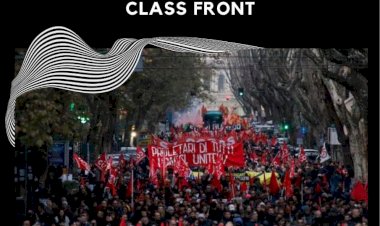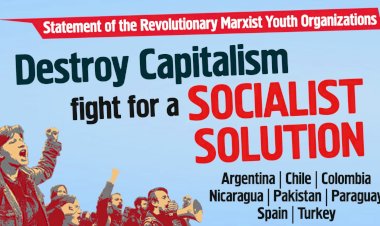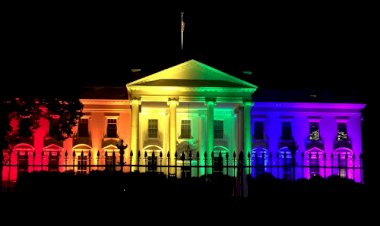A Historical Perspective on Stonewall Uprising and LGBTI Struggle- Derya Koca
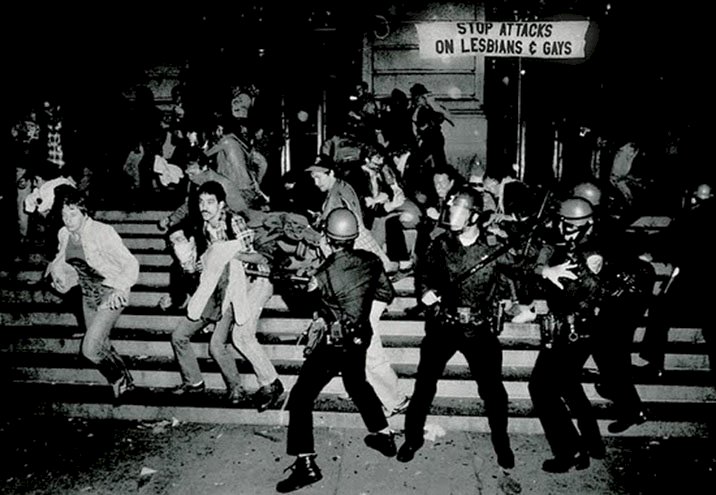
The target of the jihadist massacre that took place in Orlando on June 12 was the LGBT people. 50 people were massacred. Far-right US presidential candidate Donald Trump did not wait for a second to say "I told you". Because the murderer was a jihadist Muslim. Trump never hesitate to use the murderes' identity to promote his anti-immigrant politics . The massacre immediately turned into a campaign for Muslim immigrants by right-wing politicians who have very common characteristics with jihadists in terms of hate towards the LGBTI people. However, if we look back to history, we can see that the past of the USA is full of attacks against blacks, homosexuals and many oppressed identities. Just like the rest of the world.
The history of repression against homosexuals is precisely hidden in the dynamics that make the USA the biggest imperialist power in the world. Representing the most reactionary elements of those dynamics, Trump is not an exceptional figure neither in the USA nor in the world. Considered as one of the “most advanced” countries in terms of gay rights in the world, the history of the USA society is full of great pressures towards homosexuals. The US government has put systematic pressure on LGBTIs for decades. Great struggles were given to abolish anti-homosexual laws. Many of them were murdered with police bullets and hate killings.
The understanding, which force LGBTIs to stuck in underground bars in order to escape from social pressure, bourgeois moralism and to act freely, had committed countless massacres before. It would be useful to mention a history of rebellion after the Orlando massacre: LGBTIs opened the flag of a rebellion that lasted for days after the police massacre at the gay bar in Stonewall. On the anniversary of that rebellion, a Pride March is organized every year: for equality and dignity.
The History of Homosexuality: The History of Oppression
Only one of the many forms of oppression created by class societies is the oppression of homosexuals. The birth of private property, which led to the emergence of class societies, revealed the most appropriate family form for its continuity. As of the rise of bourgeois society, that is, in the 19th century, when the foundations of today's society were laid, controlling the population and ensuring its continuity became much more critical than in previous societies. Capitalist production based on wage labor has to ensure the existence of future generations of workers, or even more than necessary, so that workers' wages remain as low as possible. Even the care and discipline of the next generations should be on the family's back. Heterosexual relationship is an indispensable norm for capitalist production. Anything that contradicts it and makes it indisputable will also declare it abnormal. Homophobia, anti-homosexual laws, hate killings, far-right trends and endless repression are immanent in capitalist society that cannot be ended through reforms.
It is naïve to expect a solution from the mechanism that constantly reproduces the problem. The capitalists will not give up the bourgeois family, which is of vital importance to their profits. Its hell that imposes gender roles on women and men can only be demolished through a radical social transformation.
The beginning of the class societies is the milestone of all macro problems of humanity. Therefore, in capitalist class society and the other forms of class society before capitalism, sexual lives were also under control of the rulers. What makes capitalist society different in this sense is that it defines gender roles at an unprecedented level and makes it the subject of criminal laws. Sexuality was now determined by law, not by traditions, as in the old society. Sexuality has been turned into a public issue of the state in capitalist era.
Capitalist modern individualism has created the conditions for establishing private lives. By providing a historical break from the power of the church and traditional communities, it enabled the discovery, visibility and identity reconstruction of modern homosexual experiences. Marx expresses this process as follows: "In this society of free competition, the individual appears detached from the natural bonds etc. which in earlier historical periods make him the accessory of a definite and limited human conglomerate.[1]" In other words, capitalism has formed the basis for the more widespread and free life of homosexual relations, which is as old as human history, and also imposed moralism that puts it under great pressure.
This duality brought about the fact that homosexual relationship was politicized as an oppressed identity. However, in the pre-capitalist societies, there are already forms of relationships that we refer to as gay, lesbian, bisexual, transsexual or intersexual today. For example, in ancient Greece, homosexual relations were glorified as the highest form of love. Indigenous people living in a classless society, on the other hand, welcomed the existence of “berdaches” individuals, which we call transsexuals. They were equally respected in society, even as two-spirited people and freely lived their lives as respected people. In capitalism, any form of human sexual relation were categorized, discriminated and even banned.
oppressed identity. However, in the pre-capitalist societies, there are already forms of relationships that we refer to as gay, lesbian, bisexual, transsexual or intersexual today. For example, in ancient Greece, homosexual relations were glorified as the highest form of love. Indigenous people living in a classless society, on the other hand, welcomed the existence of “berdaches” individuals, which we call transsexuals. They were equally respected in society, even as two-spirited people and freely lived their lives as respected people. In capitalism, any form of human sexual relation were categorized, discriminated and even banned.
The word homosexual was first used in the 1870s and described as a disease. Humanity was perceived as having two populations, either homosexual or heterosexual. However, there is a wide range of relationships, from experiencing only once to having homosexual relationships only. In other words, the world is not divided into two groups as homosexuals and heterosexuals. The “treatment” of the “disease” was the most degrading ways in various countries such as hormone therapy, psychoanalysis, isolation, imprisonment. The carriers of this “disease” were men because women (with the return of the puritan Christian understanding) were thought to have no sexual desire. The word heterosexual was first used in 1890. The first widespread homosexual experience belongs to men because the men entered the public spaces that diverge from traditional communities and include the individual's autonomous sphere first.
Women's experiences (not sexual experience but the experience of having an autonomous life) correspond to a later date. Gays came together in the 19th century in Europe's major cities such as Berlin, Paris and London, creating their own spaces and their own subcultures. These places were mostly cafes and bars that facilitated finding partners and allowed to escape social pressure. By the early 20th century, gay venues spread to all cities. Working-class homosexuals were exposed to the pressure and humiliation of the police in these underground bars every day because these areas in poor neighborhoods were the easiest targets and were under constant control. The bourgeois homosexuals had their methods to anonymize their relations.
In the capitalist society, where the gender roles of men are accepted as the dominant role, it would not be possible for the people who “should be the bearer of moral values” of society to prefer any life other than this role. Therefore, homosexuals, especially gays, were frequently exposed to attacks and arrests.
Two Poles One Policy
The October Revolution, which shaped the 20th century, still constitutes the highest level in women's and gay rights. In "What is to be done?" Lenin clearly proposes that workers must oppose all cases of tyranny, oppression, violence and harassment, no matter which class is affected and this will be one of the most fundamental principles of a real revolutionary class consciousness.With this programmatic approach The October Revolution became the “Feast of the Oppressed”.
The Bolsheviks had opened a relentless war against bourgeois family and sexism. Women, homosexuals and oppressed people are took a huge step towards liberation through workers power that was impossible in bourgeois society. The October Revolution decriminalized homosexuality. Same-sex marriage became law. Dining halls and kindergartens were opened for the demolition of the bourgeois family institution, women's equality and gender equality. Divorce made easy. A relentless struggle began with bourgeois moralism and sexism.
In 1923, director of the Moscow Institute of Social Hygiene, Dr. Grigori Batkis said:
“It declares the absolute noninterference of the state and society into sexual matters, so long as nobody is injured, and no one’s interests are encroached upon. [Emphasis in original.]
Concerning homosexuality, sodomy, and various other forms of sexual gratification, which are set down in European legislation as offences against public morality—Soviet legislation treats these exactly the same as so-called “natural” intercourse. All forms of sexual intercourse are private matters. Only when there’s use of force or duress, as in general when there’s an injury or encroachment upon the rights of another person, is there a question of criminal prosecution.”[2]
The Public Relations Commissioner Grigorii Chicherin, who was among the top representatives of the Soviets in the Brest-Litovsky with Trotsky, was openly gay. It was possible to see cross-dressing women in the Red Army. Despite all there revolutionary atmosphere, the fate of freedom was tied to the fate of the revolution and the fate of the revolution to the world revolution.
The family was sanctified again in the USSR, which turned into a state capitalist regime with Stalinization and stuck in a single country. The family was placed at the center of ancient "tasks", both to increase the population and to establish authority in the country that was destroyed by war. Difficult days of the revolution were also the beginning for homosexuals. In 1934, homosexuality was banned and labelled as bourgeois heresy. Although it had no scientific basis, it was seen as a hypnosis-treatable disease. The homosexuals who opposed this, in the period of Big Cleaning (1936-38) were charged with "having degenerate bourgeois culture". Communist parties around the world were ordered to expel gays from the party.
In short, around the production process (can also be read as around state capitalism) all the scum of the old society was standing. All the principles of Bolshevism were destroyed. In his letter of Harry Whyte, who was a gay member Communist Party of Great Britain, asks Stalin that “can a homosexual be considered someone worthy of membership in the Communist Party?” he wrote to Stalin[3] but never received a reply:
“…Capitalism, which needs an enormous reserve army of labour and cannon fodder in order to flourish, regards homosexuality as a factor that threatens to lower birth rates (as we know, in the capitalist countries there are laws that punish abortion and other methods of contraception)….
But, frankly speaking, even if this possibility were established, I would be uncertain all the same how desirable it was in fact to convert homosexuals into heterosexuals. Of course, there might be certain political reasons that would make this desirable. But I imagine that the necessity for such a leveling procedure should be supported by unusually strong reasons.”
The 20th century meant at once the most advanced and the most terrifying period for homosexuals. The leap of the October Revolution set the bar high. Under Nazi rule, homosexuality was tried to be eliminated by mass murder. In the USSR homosexuals were oppressed. Thousands of homosexuals in Cuba were sent to labor camps because they were declared heresy. In the USA, it was the years of witch hunt.
Soviet propaganda poster. The duty of women to the country is blessed as motherhood. The picture shows a proud woman with 10 children.
Accelerating to become the world's largest imperialist power in the post-war period, the USA was performing 60% of the world's production. This meant that a huge army of workers was needed. In this period when gender roles were strictly imposed, communists and homosexuals were arrested with witch hunts. During the Eisenhower period, homosexuals were arrested and “forced to receive treatment” because they were mentally ill and prone to “communism”. The visibility of homosexuals in the public sphere was forbidden and prison sentences were imposed. In short, homosexuals were not given any right to live anywhere. Official communist parties were no longer the megaphone of the oppressed because of the Stalinist reactionarism. For this reason, by the 60's, homosexuals are trying to exist as a subculture in the private and small places they have established all over the world. However, homosexuality did not exist as an identity or movement as it is today. The occurrence of this date backs to the 60s.
Stonewall and After
On June 28, 1969, a great riot broke out as a result of police harassment and pressure in a bar called Stonewall in a poor neighborhood of New York. In one of the usual routine police raids, homosexuals triggered a rebellion that would last for days and spread to the whole world, saying "enough is enough". The riot turned into a popular revolt f the whole poor neighborhood against police terror. Every year, homosexuals took to the streets for a dignity, in order not to be humiliated, killed, and live as an equal citizen because of their sexual identity.
In the struggle for equality of homosexuals, a significant part of the early activist leaders were homosexuals who were expelled from the communist parties. Although they were an important part of 68, they settled on an increasingly apolitical ground by the 70s. Under the Stalinist legacy, the left exclused the homosexual from the revolutionary struggle. But the need for a fight agains homophobia did not end that led them to to continue their struggle adopted the hegemony of bourgeois and identity politics. Stalinism has contributed a lot in this.
As of 2000s, the spread of identity politics, the left's full engagement with identity politics and leaving the class grounds became the main reason for the failure of LGBTI movement to be part of the socialist revolutionary struggle.
Revolutionary Appeal
LGBTI rights are accepted only in very few developed capitalist countries. Even in accepted countries, bourgeois society continues to impose discrimination and bourgeois moralism as reproduces them again and again. Outside of these countries, which constitutes the minority of the world population, the situation is quite serious. In regions such as the Middle East, South Asia and Africa, murders and massacres take the lives of thousands of homosexuals every year. The jihadists do not give homosexuals the right to life. The right to live and work in dignity is taken away from them. The problem, which is treated as a suprapolitical identity, confines homosexuals and trans people into bourgeois politics. Liberal limitations make it easier to see the demands of the LGBTI movement as a consumption opportunity within the market, but the most vital claims hinder the pressure wall. Pride Marches sponsored by monopolies like Citibank, Coca Cola etc. in most western countries create confusion among the LGBTI people and make them stay away from radicalization. However, the problem is the capitalists itself.
The demands of homosexuals contradict with the interests of the capitalists and the bourgeois society that is the source of oppression and its hypocritical politics. Bourgeoisie is flexible enough to internalize the LGBTI demands such as gay marriage but only under the bourgeois family and its social function to raise children and burden of domestic work. That is not a real liberation.
The solution to the LGBTI and women's question is impossible if it is handled without a class basis. Bourgeois society is based on a society where it will guarantee the future working class generations and regards other forms of relationship as "abnormal".Capitalism is not capable of solving any problems which born by its very foundations. Socialism for the liberation of the LGBTI!
No bourgeois politics can fight bourgeois moralism based on inequality. Only a revolutionary struggle that fights against the class that produces bourgeois moralism and sexism can overthrow it. Starting from today, the empowerment of socialists for this relentless struggle is the only alternative that will bring the anger and energy of the oppressed together. When the power of all the oppressed is combined with the revolutionary power of the working class, no power can stand before us. For this reason, under the red banner of revolutionary Marxism, we call on all LGBTIs to fight for an borderless classless, free world and dignity!
[1] Marx, Grundrisse, Introduction https://www.marxists.org/archive/marx/works/1857/grundrisse/ch01.htm
[2] In Sherry Wolf, History, Politics and Theory of LGBT Liberation.
[3] Letter to Stalin: “can a homosexual be in the Communist Party?”
https://www.marxist.com/letter-to-stalin-can-a-homosexual-be-in-the-communist-party.htm



